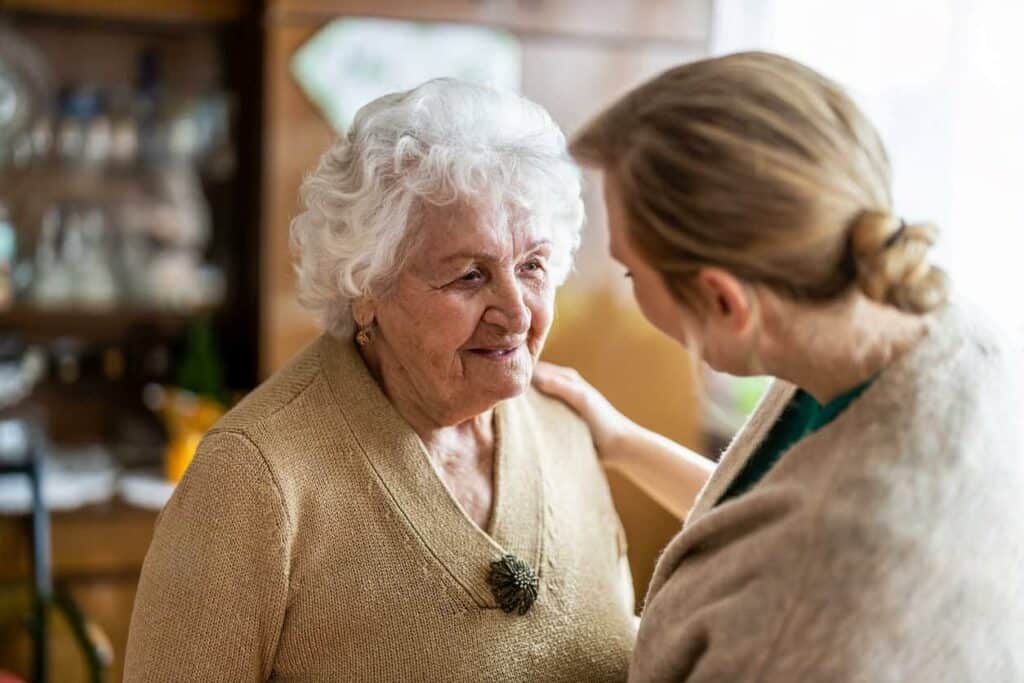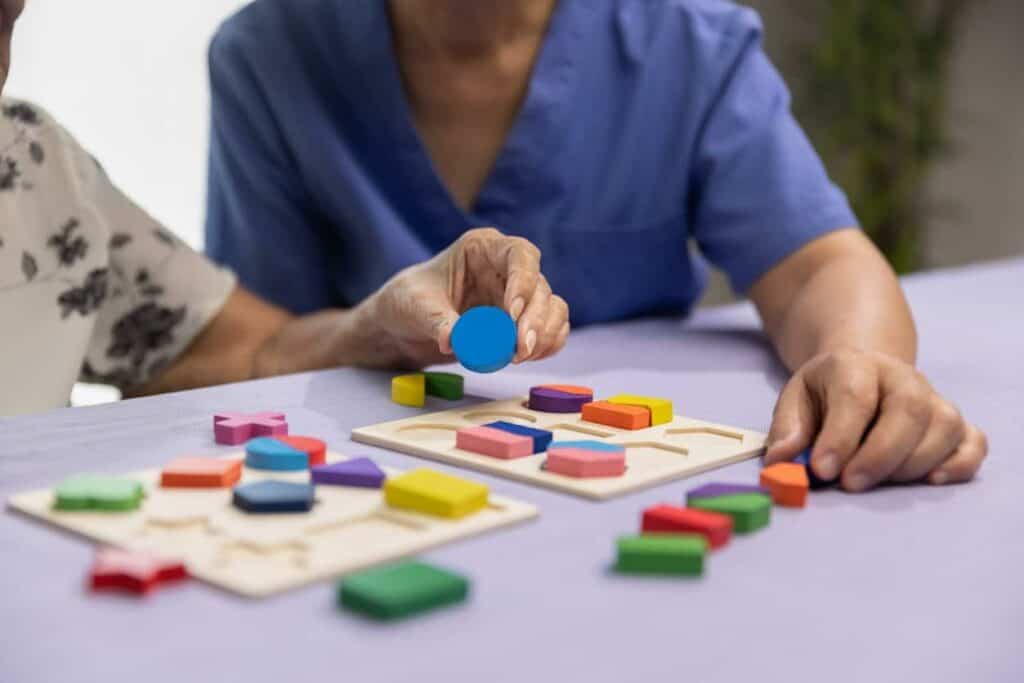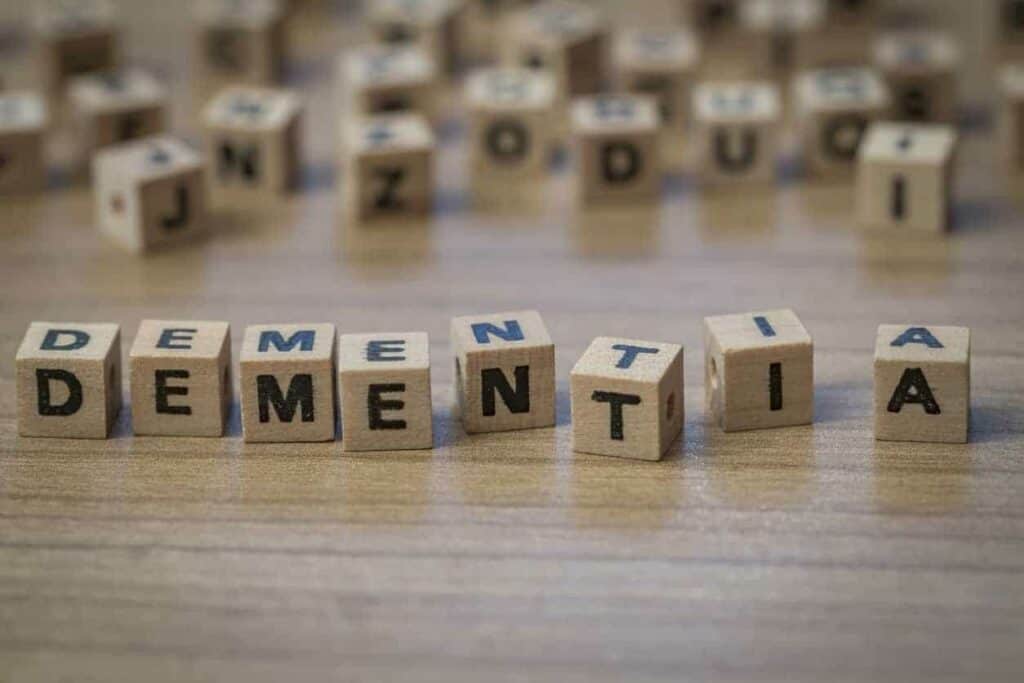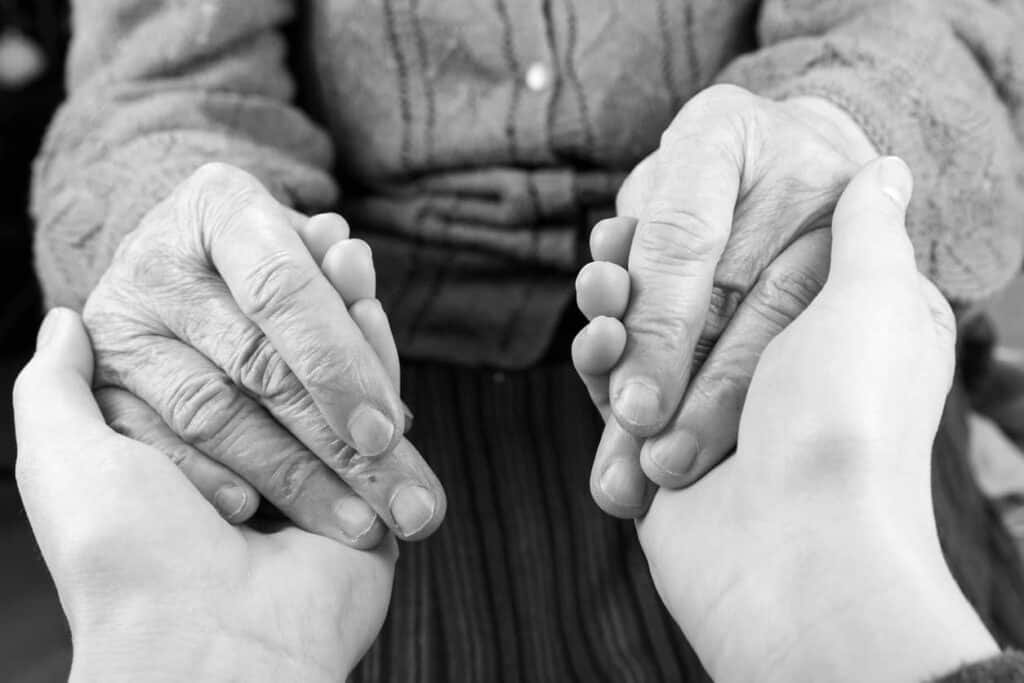
25+ Joyful Indoor Activities for Seniors That Will Transform Their Day
As seasons change in Reno and Carson City, or when mobility becomes a challenge, finding engaging indoor activities for seniors can feel like a difficult

Are you caring for a senior with dementia? Are you curious about the importance of understanding dementia’s progression and changing care needs in the elderly? Look no further.
In this article, we’ll take you through the seven stages of dementia and why learning about this progression is essential in providing the best possible care. Let’s explore dementia together.
Dementia is a term used to describe a group of cognitive disorders that affect a person’s memory, thinking, and ability to perform activities of daily living. Senior caregivers need to understand the concept of dementia because it is a prevalent condition among the elderly. It significantly impacts their quality of life in different ways as it progresses.
Dementia is not a specific disease. It’s a broader term that includes various neurological conditions, the most common of which is Alzheimer’s disease. These conditions have a common feature of progressive cognitive decline. It means that over time, seniors with dementia may have increasing difficulty with memory, reasoning, and communication. This decline in their cognitive abilities starts interfering with their daily lives as well.
Dementia predominantly affects older adults, and its prevalence increases with age. CDC statistics show that dementia, especially Alzheimer’s, affects 5.8 million Americans, out of which 6.5 million are 65 or older. Between 2015 and 2060, the number of people living with dementia will increase with a significant rise in Hispanics and African Americans.
Dementia typically progresses through different phases, though the exact progression can vary depending on the underlying cause. The three primary phases are:
1. Early Stage: In this phase, the elderly may experience mild cognitive impairment, forgetting names or recent events. They can still perform most daily tasks independently, but family members or close friends may notice subtle changes.
2. Middle Stage: This is often the most challenging phase, characterized by more significant memory loss, confusion, and difficulty with tasks like dressing or cooking. Behavioral and personality changes may become evident, making caregiving increasingly demanding.
3. Late Stage: In the final stage, seniors with dementia are typically unable to communicate effectively, recognize loved ones, or perform basic self-care tasks. Full-time caregiving or institutional care is often required.
As dementia advances through its phases, it can profoundly affect a person’s daily life.
Early on, older people may struggle with managing finances, driving, or remembering appointments. In the middle stage, they may need assistance with personal care and become prone to wandering or agitation.
In the late stage, the seniors are often completely dependent on others for all aspects of daily living, and the emotional toll on both the seniors and their caregivers can be overwhelming.
Dementia is a complex condition that significantly impacts the lives of seniors and their families. Early diagnosis and intervention can help improve the quality of life for older people with dementia and enhance their ability to maintain independence and dignity for as long as possible.

Dementia typically progresses through seven stages, each with its own set of characteristics and challenges. Understanding these seven stages of dementia can help the caregivers provide appropriate care and support for those living with dementia.
In the first stage of dementia, there is typically no noticeable cognitive decline. The elderly continue to function independently, manage their daily routines, and fulfill their responsibilities. Their memory, thinking, and behavior remain within the normal range for their age. They don’t show any evident signs or symptoms of dementia. So, it’s hard to diagnose.
They may rarely show confusion in processing information but that’s not particular to dementia as aging people, in general, often exhibit signs of confusion and disorientation. As a caregiver, you should pay attention to subtle changes in memory and thinking and consult with the healthcare team if you notice any concerning changes.
Stage 2 of dementia is often referred to as “very mild cognitive decline”. It is characterized by minor memory lapses. The elderly may occasionally forget where they placed items like keys or struggle to recall the names of their family or peers. These lapses are commonly related to typical age-related forgetfulness and do not significantly impact daily life or independence.
Early detection during this stage can be useful, enabling the healthcare team to identify potential risk factors and causes for cognitive changes. However, it’s important to remember that not all minor memory lapses in this stage will progress to dementia. It’s essential to maintain open communication with the healthcare team and monitor cognitive changes over time for a more accurate assessment.
In stage 3, mild cognitive decline becomes more noticeable. Seniors may find it challenging to remember recent events, locate the right words during conversations, or efficiently organize tasks. These cognitive changes start to affect daily life, making activities like managing finances, keeping track of appointments, or planning tasks more difficult.
Family members and caregivers need to observe these difficulties and provide support and guidance. This stage is an important time for seeking evaluation and guidance from healthcare providers who specialize in dementia. A comprehensive assessment can help identify the underlying causes of cognitive decline and guide caregivers in planning a more personalized care plan.
Stage 4 represents a significant cognitive decline. Memory loss becomes more noticeable, and the elderly may struggle to recall recent events, personal details like their home address, or even the names of their close family members. Complex tasks such as cooking or managing finances become increasingly challenging.
Caregivers play a more substantial role in supervising and assisting with these activities, which can be emotionally taxing and physically demanding. Home safety modifications may become necessary to ensure the seniors’ well-being. During this stage, you should prioritize the safety and comfort of the elderly and explore various support options.
Stage 5 is characterized by an advanced cognitive decline. Older people may struggle to remember their names or recognize familiar faces, including those of immediate family members. Personal care tasks like bathing, dressing, and eating often require assistance. Emotional challenges can emerge, with the elderly occasionally showing signs of frustration, anxiety, or agitation.
Family caregivers may find it increasingly challenging to meet the needs of their loved ones during this stage. Respite care, which provides short breaks for caregivers, can be a valuable resource to help manage the growing demands of caregiving. Hired caregivers may feel the need to develop a more informed and tailored care approach. Maintaining a supportive and empathetic environment for both the elderly with dementia and their caregivers is essential to deal with the arising emotional challenges.
In stage 6, severe cognitive impairments are visible. Verbal communication often diminishes, and seniors may lose the ability to communicate effectively. They may display behavioral changes, including restlessness, agitation, or even aggression. If they’re at home, wandering, both inside and outside the home, can become a safety concern.
Specialized dementia care is typically required at this point, whether in the form of dementia care facilities or in-home care from trained caregivers. Safety measures, such as secure environments and constant supervision, become inevitable to prevent accidents and ensure seniors’ well-being. Maintaining a compassionate and patient approach to caregiving is essential in addressing the unique challenges presented by older people with severe dementia.
The final stage of dementia, stage 7, is identified by a very severe decline. Seniors often lose the ability to communicate verbally and may become bedridden. While verbal communication is largely lost, non-verbal cues such as facial expressions and gestures may still be present. Care focuses primarily on providing comfort, maintaining quality of life, and ensuring dignity in the final stages of dementia.
During this challenging time, palliative care and hospice services can provide comprehensive support to both seniors and their families. Family members and caregivers are encouraged to provide emotional support, comfort, and companionship as the senior loved one reaches the end of their dementia journey.

Understanding the 7 stages of dementia and how they affect senior care is important for various reasons, ultimately leading to better outcomes for both seniors and their caregivers.
First and foremost, understanding these dementia stages is vital for caregiver preparedness. When family members or senior caregivers have a clear understanding of the progression of dementia, they can better prepare themselves with the knowledge, skills, and resources needed to provide effective dementia care.
This includes knowing what to expect in terms of cognitive decline, behavioral changes, and physical limitations at each stage. With proper preparation, caregivers can reduce anxiety and stress in seniors, allowing them to provide more compassionate and competent care.
When caregivers recognize the stages of dementia, it enables them to provide more tailored care and support. Each stage presents distinct challenges and needs, and a one-size-fits-all approach is not effective. By identifying where a senior is in their dementia journey, caregivers can adapt their care strategies to match the seniors’ cognitive and physical abilities.
For instance, in the early stages, seniors may benefit from memory exercises and activities that stimulate cognitive function, while in the later stages, the focus may shift to assisting with basic activities of daily living (ADLs). This tailored approach not only enhances the quality of care but also maintains the senior’s dignity and independence to the greatest extent possible.
When caregivers can comprehend all stages of dementia, they can effectively anticipate challenges and changing needs as the condition progresses. This proactive approach enables caregivers to plan for modifications to the living environment, access to medical and support services, and financial considerations.
For example, in the moderate stages of dementia, safety measures like installing grab bars or removing potential hazards in the home become critical. It is important for caregivers to anticipate these needs and to make sure the senior’s well-being is in good hands as the disease advances.
Caregivers need to understand the 7 stages of dementia, so they can significantly improve the quality of life for seniors. By tailoring activities and care to their cognitive and physical abilities, seniors can continue to engage in meaningful and enjoyable experiences. This not only helps preserve their cognitive function for longer but also contributes to their emotional well-being.
Seniors in the early stages may still be able to participate in hobbies and social activities, which can provide a sense of purpose and connection. Understanding the stages also allows caregivers to address behavioral and psychological symptoms more effectively, reducing distress and enhancing the senior’s overall quality of life.
Caregiving for seniors with dementia can be emotionally and physically demanding. Beforehand preparation allows caregivers to have realistic expectations and strategies for managing the challenges that arise. This knowledge can significantly reduce caregiver stress and burnout, allowing them to provide consistent and compassionate care over the long term.
Knowing what to expect in terms of cognitive decline and behavioral changes can also help caregivers seek respite and support when needed, preventing the negative consequences of caregiver exhaustion.
Lastly, it improves communication between caregivers, the healthcare team, and family members. When everyone involved in a senior’s care has a common understanding of the progression of the disease, it becomes easier to coordinate and plan for the best possible care for elderly loved ones.
This shared knowledge fosters collaboration and ensures that the senior’s needs are met comprehensively. Besides, it facilitates open and honest discussions about care goals, treatment options, and end-of-life decisions, allowing seniors to maintain a sense of control and dignity in their care.

Caring for seniors with dementia is a complicated journey that evolves as the disease progresses through all 7 stages of dementia. It is important to provide care that is tailored to the elderly’s needs at each stage. This may include providing assistance with activities of daily living (ADLs), doing regular assessments, and involving the medical team to manage dementia symptoms.
Hired caregivers need to understand and implement stage-appropriate strategies and interventions to ensure adequate care.
In the early stages of dementia, the elderly may experience minor memory lapses and cognitive changes. Caregivers should focus on promoting mental and social stimulation. Engage seniors in memory-boosting activities like puzzles, reading, and reminiscing.
Encourage a balanced diet, physical exercise, and a consistent routine to support overall well-being. Safety measures like removing tripping hazards and labeling important items can also be beneficial. Maintain open communication and respect for the elderly’s independence.
As dementia progresses, memory lapses become more pronounced. Help seniors with daily tasks like managing finances and organizing medication. Create a calm and structured environment to minimize confusion.
Communication may become challenging, so use clear, simple language and visual cues. Encourage participation in support groups and day programs to combat isolation. Be patient, and empathetic, and maintain a positive atmosphere to reduce frustration and anxiety.
In this stage, older people may forget recent events and require assistance with complex tasks. Focus on maintaining routines and providing supervision to prevent accidents. Help with personal care activities like bathing and dressing.
Ensure proper nutrition and hydration. Consider respite care to prevent caregiver burnout. Maintain a consistent schedule for activities, as familiarity can provide comfort.
As cognitive decline advances, the elderly may struggle with communication and require more assistance with daily living. Create a safe environment by securing the home and taking proper safety measures.
Encourage sensory stimulation through music and tactile activities. Maintain a routine for personal care and meals, as routine provides comfort. Manage behavioral changes with a patient and compassionate approach.
Seniors in this stage have severe cognitive impairments and show clear behavioral challenges. Provide around-the-clock supervision to prevent wandering and ensure safety. Focus on maintaining dignity and comfort.
Simplify communication. Be prepared for incontinence and manage it with compassion. Care facilities specialized in dementia may become necessary.

Regular assessments are crucial throughout the caregiving journey. These assessments help caregivers gauge the progression of dementia and adapt care plans accordingly. Conduct cognitive assessments to track changes in memory and thinking abilities. Regularly evaluate physical health, including nutrition and mobility, to address emerging issues.
Assess emotional well-being and behavior to manage any mood changes or aggression effectively. Keep a record of medications and their effects. Regular assessments also enable caregivers to detect signs of discomfort or pain that seniors with dementia may not be able to express verbally.
The involvement of the healthcare team is integral to comprehensive dementia care. Collaborate with physicians to establish a clear diagnosis and understand the specific type of dementia. Seek guidance from geriatric specialists or neurologists who specialize in dementia care.
Consult with social workers and therapists who can provide valuable insights and support for both seniors and caregivers. Regularly update the elderly’s physician on changes in the senior’s condition and follow their recommendations for medication management and therapies. Consider the expertise of hospice and palliative care teams when approaching the end stages of dementia to ensure the best possible quality of life.

It can be an incredibly challenging journey for both family members and hired caregivers to cope with the emotional impact of caring for a loved one with dementia. When you witness the decline of someone you care deeply about, it can evoke a range of emotions, including sadness, frustration, guilt, and even anger. You need to understand and address these emotions to maintain your well-being and provide the best possible care.
The emotional impact of witnessing a loved one’s decline due to dementia can be profound. It’s natural to feel a sense of grief and loss as you see their cognitive and physical abilities diminish.
You may also experience frustration when communication becomes challenging, or when behavioral changes occur. It’s important to remember that these emotions are normal reactions to a difficult situation.
Caregivers often grapple with guilt, feeling that they could do more or questioning their decisions. The key is to acknowledge and process these feelings rather than suppressing them.
Caring for an elderly with dementia can be stressful. However, you need to take certain steps to maintain your well-being.
You don’t have to navigate the emotional challenges alone. If you’re a family caregiver, seek support from external resources. Professional caregivers, such as home health aides or nursing services, can assist with daily tasks, allowing you to focus on emotional support and spending quality time with your loved one. Respite care services can provide temporary relief from caregiving responsibilities.
Family and friends can offer emotional support, but sometimes, they may not fully understand the unique challenges of dementia caregiving. Support groups and dementia-specific organizations can connect you with people who share similar experiences. They can offer practical advice, a listening ear, and a sense of community. Remember, seeking help is a sign of strength, not weakness. It’s an essential step in preserving your well-being and providing the best care possible for your loved one with dementia.

Planning and decision-making for elderly with dementia are crucial steps to ensure their well-being, safety, and quality of life. This process involves early planning, addressing legal and financial matters, and exploring available senior care options, such as assisted living.
Early planning is of paramount importance when dealing with dementia. This progressive condition gradually impairs cognitive and decision-making abilities, making it essential to address critical issues while the elderly are still capable of participating in the decision-making process. Early planning allows seniors to express their wishes and preferences regarding their care, medical treatment, and end-of-life decisions. It also enables them to designate a trusted person to make decisions on their behalf when they can no longer do so.
Additionally, early planning provides you an opportunity to discuss and document financial and legal matters, ensuring that the elderly’s assets and affairs are managed according to their wishes. By addressing these aspects proactively, families can reduce stress and uncertainty in the future and maintain the seniors’ dignity and autonomy as long as possible.
For loved ones with dementia, there are many senior care options; not only at home but also at specially designed care facilities.

Assisted living and dementia care programs offer a supportive environment tailored to the physical and cognitive abilities of the elderly with dementia. Their goal is to improve the quality of life for seniors with dementia while giving their families peace of mind by providing them with a structured and secure environment, tailored care plans, cognitive stimulation, and emotional support.
Assisted living facilities are equipped to support seniors with dementia in various ways. They offer a structured and secure environment where the elderly receive assistance with daily tasks that may become challenging due to cognitive decline.
Trained staff members provide medication management, help with grooming, dressing, and bathing, and assist with meal preparation and housekeeping.
One key advantage of assisted living for dementia patients is the provision of a consistent daily routine. Predictable schedules and familiar surroundings can help reduce anxiety and confusion.
Additionally, many assisted living facilities have memory care units or specialized dementia care programs that focus on engaging activities and therapies designed to stimulate cognitive function and memory retention.
Specialized dementia care programs within assisted living facilities offer several benefits:
Assisted living facilities with specialized dementia care programs often provide a range of services and amenities to cater to the unique needs of people with dementia:

When you understand the seven stages of dementia, it’s like having a roadmap for providing compassionate and more effective senior care. It empowers caregivers and family members to adapt to the evolving needs of their loved ones, ensuring they receive the support and assistance they deserve throughout their journey with dementia.
By recognizing and addressing the challenges specific to each stage, we can enhance the quality of life for seniors and provide them with the best possible care. So, keep learning, keep caring, and continue making a positive difference in the lives of those with dementia.
Amy’s Eden is one of the trustworthy names in Carson to provide dementia and memory care. If your loved ones suffering from dementia and you are considering specialized care options for them, contact us today.
Get care >

As seasons change in Reno and Carson City, or when mobility becomes a challenge, finding engaging indoor activities for seniors can feel like a difficult
Family Survey Please share your honest feedback to help us improve the care and safety of your loved one.
Professional Senior In-Home Care in Carson City Keep your loved one in the comfort of their cherished home. Amy’s Eden delivers exceptional senior care services

The Best Home Care in Reno, NV The comfort of your home, the quality of Eden. We provide compassionate, professional in-home care services for seniors

Amy's Eden Senior Care © 2023